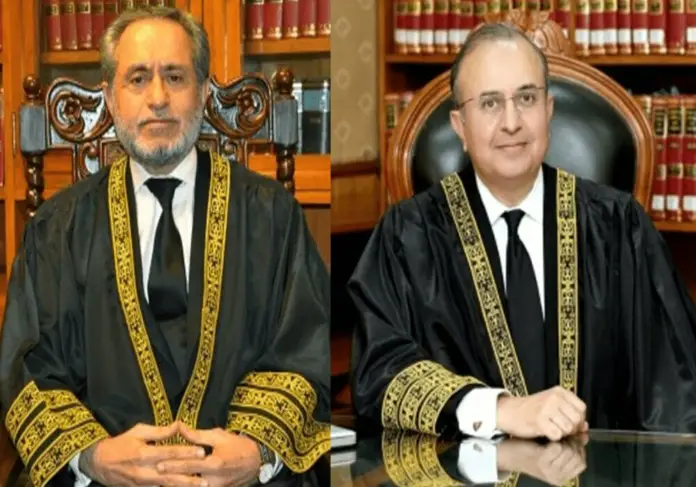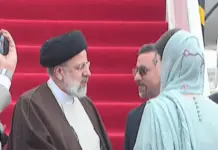The Supreme Court’s Justices Syed Mansoor Ali Shah and Jamal Khan Mandokhail have demanded that the Chief Justice’s authority as a “one-man show” be reviewed since the country’s highest court could not “be dependent on the solitary decision of one man.”
The two justices made the remarks in a thorough dissenting note for the top court’s March 1 ruling regarding holding elections in Punjab and Khyber Pakhtunkhwa, where the two provincial assemblies have been dissolved. It which was published hours after the SC took up the PTI’s appeal challenging the postponement of elections in Punjab.
Justices Syed Mansoor Ali Shah and Jamal Khan Mandokhail noted in a 27-page comprehensive judgement that it is critical “to revisit power of ‘one-man show’ enjoyed by office of Chief Justice of Pakistan.”
There appeared to be a “lack of clarity” on the subject, Chief Justice of Pakistan (CJP) Justice Umar Ata Bandial stated after a suo motu notice of the elections in Punjab and Khyber Pakhtunkhwa on February 22.
For the purpose of hearing the case, CJP Bandial also assembled a nine-person bench, which included himself, Justice Ijaz ul Ahsan, Justice Syed Mansoor Ali Shah, Justice Munib Akhtar, Justice Yahya Afridi, Justice Sayyed Mazahar Ali Akbar Naqvi, Justice Jamal Khan Mandokhail, Justice Muhammad Ali Mazhar, and Justice Athar Minallah.
CJP, however, divided the larger bench into a five-member bench on February 27. When Justice Jamal Mandokhail objected to the start of the proceedings under Article 184 (3) on February 23, the SC also issued a written ruling that was dictated in open court.
The CJP then reconstituted the bench, which now consists of Justices Mazhar, Shah, Akhtar, Mandokhail, and Shah. Justice Ahsan, Justice Afridi, Justice Naqvi, and Justice Minallah all chose to withdraw from the hearing.
The Election Commission of Pakistan (ECP) was ordered by the SC to confer with President Arif Alvi for elections in Punjab and Governor Ghulam Ali for elections in KP on March 1 in a 3-2 decision.
However, the ECP was given permission by the majority decision, written by CJP Bandial, Justice Akhtar, and Justice Mazhar, to suggest a poll date that deviates from the 90-day timetable by the “bare minimum” in the event of any practical issue.
Justice Mandokhail and Justice Shah, two of the four justices who had added remarks to the order from February 23, disagreed with the decision. The two senior court justices stated in a combined dissent note that the CJP’s suo motu proceedings were “wholly unjustified” and were also started in “undue haste.”
The two judges stated in a 28-page lengthy dissenting note that the top court’s “original jurisdiction” under Article 184(3) of the Constitution was not only “‘discretionary,’ but also “special,” and “extraordinary,” and that it should only be used “with caution” in “exceptional cases,” involving the enforcement of fundamental rights, that are deemed “fit” for being handled by the court.
According to Article 184(3) of the Constitution, the Supreme Court has original jurisdiction over cases involving “public importance” questions pertaining to the “enforcement of any of the fundamental rights” of Pakistani citizens.
They said that the SC would not have taken up the suo motu notice if the Lahore High Court (LHC) had determined the intra-court appeals remaining before it about the postponement in the polls and the Peshawar High Court (PHC) had decided the writ petition pending before it.
The justices said that “under Article 184(3) of the Constitution, the present suo motu proceedings and the related constitution petitions do not constitute a fit case to exercise the extraordinary original jurisdiction of this Court.”
In their defense, they claimed that the SC lacked the authority to “make an order of the nature mentioned in Article 199 of the Constitution against a judicial order of a high court, directly or indirectly.”
The two emphasized that “it is high time that we revisit the power of ‘one-man show’ enjoyed by the office of the CJP” in order to improve the institution and assure public trust and confidence in the highest court.
This court must be governed by a rule-based system approved by all judges of the court under Article 191 of the Constitution in order to exercise its jurisdiction under Article 184(3), including the exercise of suo motu jurisdiction. This system must also govern the formation of benches to hear such cases, the formation of regular benches to hear all other cases instituted in this court, and other matters.
“The practice of putting on a “one-man show” is not only antiquated, outmoded, and incompatible with current democratic ideals, but it is also contrary to effective administration.”
“One-man shows result in the concentration of power in the hands of one person, increasing the likelihood that authority may be abused. A collegial structure with checks and balances, on the other hand, aids in fostering accountability and openness while preventing abuse of authority.”
The two justices said that the independent operation of the province legislative, executive, and judicial institutions constituted the fundamental tenet of federalism.
The justices stated that the top court had been “ushered into a ‘political thicket'” as a result of the suo motu procedures and the related constitutional petitions.
“In this case, the two honorable judges, having reached a decision, left it up to the honorable Chief Justice whether they would seat or not for a future hearing of the case.







